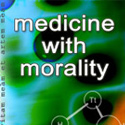RU486 and Médecine Sans Moralité. An Opportunity for Strong, Ethical Leadership by Government
Inquiry into Therapeutic Goods Amendment
(Repeal of Ministerial responsibility for approval of RU486) Bill 2005
community.affairs.sen@aph.gov.au
Submission on behalf of
Christian Democratic Party (WA Branch)
GPO Box Z5041
Perth WA 6831
cdpwa@iinet.net.au
January 2006
Dr Lachlan Dunjey
MBBS FRACGP DObstRCOG
0407 937 513
lachlan@dunjey.name
Executive Summary:
We need also to consider the ethics of outcomes. To neglect this is to practice medicine without morality.
There are specific arguments against the introduction of RU486 as an alternative to surgical abortion.
As a nation we need to reverse the culture of ‘easy’ abortion.
The Minister for Health and Ageing should retain the responsibility for RU486.
RU486 and Médecine Sans Moralité
The French Abortion Pill and Medicine without Morality.
If the Therapeutic Goods Administration is given the responsibility for approval of RU486 then it will consider objective parameters of what we callEvidence Based Medicine. But more is required – we need also to consider the designed purpose of the drug. We cannot afford to practice medicine without morality. It is strongly recommended that the Minister for Health and Ageing retain the responsibility for RU486.
The proposed introduction into Australia of RU486 as another and more accessible way to obtain an abortion further cheapens human life and serves to entrench the ‘abortion culture’ mindset. It touches on the value we place on all human life and its expendability.
Proponents argue that Evidence Based Medicine supports that RU486 is as safe as surgical abortion and that any decision made on its introduction should only be made on this basis and not by politicians and not on grounds of religion. But this approach operates in an ethical vacuum with respect to outcome.
We need also to consider the ethics of outcomes.
It is for very good reason that the Hippocratic Oath states that I will give no deadly medicine to any one if asked, nor suggest any such counsel; and in like manner I will not give to a woman a pessary to produce abortion. Similarly, a great dictum of medicine First, do no Harm also is from Hippocrates: Primum non Nocere.
Evidence Based Medicine without consideration of outcome morality is bad medicine e.g. it could be used to consider euthanasia techniques or even the transplanting of organs from clones bred for that purpose. How to do it ‘best’ is not all that matters. Medicine without morality is frightening stuff and has the smell of burning flesh.
Specific arguments against introduction of RU486 as an alternative to surgical abortion:
- Even if small the dangers and side effects cannot be ignored. Four recent deaths in California from infection with Clostridium sordellihighlight this (see Appendix 1).
- It is likely to be more dangerous in rural areas with lack of emergency care for complications – particularly haemorrhage and infection. Senator Eggleston has highlighted this risk.
- It is more horrific than surgical abortion in its course with abdominal cramps, heavy bleeding and expulsion of the foetus.
- If, as has been argued, it will overcome problems women have accessing abortion then it will also result in a higher abortion rate – above what the majority of people already consider is too high.
The above arguments will be disputed back and forth with supporting statistics and accounts. It will be argued that the actual mortality of RU486 is very low and should not prevent the drug from being approved providing informed consent procedures are followed. But we must resist the push to introduce more ways of doing something that kills.
As a nation we need to reverse the culture of ‘easy’ abortion.
Abortion is the killing of a unique life in which, though not yet expressed, individuality is inherent and real in the genetic programming from the time of fertilisation and unique adult characteristics are already determined.
There are significant concerns re the long-term physical and psychological effects of all forms of abortion and even though these are subject to dispute, informed consent standards dictate their inclusion – at the very least as possibilities. See Appendix 2 for abstract of recent article strengthening the risk of breast cancer with abortion.
The introduction of RU486 would further entrench the ‘abortion culture’ mindset that abortion is our right and simply an extension of contraception. In order to reduce the abortion rate we need to reverse the culture of ‘easy’ abortion as a valid option. Accepting the ‘abortion culture’ mindset fails to recognise the power in people to change and exercise restraint. This has been shown in Uganda where the incidence of AIDS has fallen from 30% to 6% with the introduction of abstinence and faithfulness programs and values-based sex education programs. As much as these are anathema to those of the ‘free sex’ and autonomy culture who do not want these programs to work, the evidence is there.
It is the right and obligation of every politician to speak for ethical values that honour our country. Our nation requires this strong, moral leadership. It is strongly recommended that the Minister for Health and Ageing retain the responsibility for RU486.
Dr Lachlan Dunjey MBBS FRACGP DObstRCOG
PO Box 68 Morley WA 6943
0407 937 513
lachlan@dunjey.name
January 2006.
Appendix 1:
CDC New England Medical Journal Article Warns of Abortion
Drug Risks by Steven Ertelt
LifeNews.com Editor
December 1, 2005
Washington, DC (LifeNews.com) — An article written by Centers for Disease Control officials in today’s edition of the New England Journal of Medicine warns women of the risks of fatal infections from the RU 486 abortion drug and asks doctors to be on the lookout for toxic shock related to the abortions.
The CDC authors point to the deaths caused by the fatal Clostridium sordellii bacteria that infected four California women who used the Mifeprex abortion drug.
The article pointed out that all of the woman used one of the two-part drug process vaginally. FDA guidelines call for oral use, but Planned Parenthood abortion businesses, wanting to use the drug in lower doses, tell women to use it vaginally. All four woman were found to have the deadly virus in their uteruses.
Marc Fischer, M.D., and his CDC colleagues said that all four women died one day after going to the hospitals with recent symptoms from the infections. The women did not show normal infection telltale signs until it was too late.
“The clinical and pathological findings in these cases are similar to those in 10 other cases of C. sordellii infection of the genital tract reported in the literature,” they wrote in the NEJM.
“Of the 10 previous cases that we identified, all occurred in previously healthy young women, and nine occurred within one week after delivery (eight women) or after abortion (one woman),” they explained.
One problem they noted is that the initial symptoms of the dangerous bacteria may show as normal side effects from using the abortion drug, such as cramping or abdominal pain.
The CDC authors urged doctors treating women with such symptoms to be on the lookout for toxic shock and they said women considering an RU 486 abortion should be informed of the risks.
The article reference is: Fischer M et al. Fatal Toxic Shock Syndrome Associated with Clostridium sordellii after Medical Abortion. N Engl. J Med 2005; 353:2352-60.
Printed from: http://www.lifenews.com/nat1866.html
Appendix 2: ABSTRACT
Induced Abortion as an Independent Risk Factor for Breast Cancer:
A Critical Review of Recent Studies Based on Prospective Data
Joel Brind, PhD, Journal of American Physicians and Surgeons Vol 10 Number 4 Winter 2005
Although many case-control studies, based mostly on retrospective collection of data, have shown a statistically significant increase in breast cancer risk after induced abortion, especially before the first full-term pregnancy (FTP), this risk is denied by the National Cancer Institute and many researchers. The conclusions of ten recent studies based on prospective data collection are cited to buttress this position. These studies are examined in detail, with a focus on methodologic aspects. Collectively, these studies are found to embody many serious weaknesses and flaws, including cohort effects, substantial misclassification errors due to missing information in databases, inadequate follow-up times, inadequately
controlled effects of confounding variables, and frank violations of the scientific method. These recent studies therefore do not invalidate the large body of previously published studies that established induced abortion as a risk factor for breast cancer. Breast cancer incidence is increasing, as predicted from earlier
studies. Disclosure of the probable contribution of induced abortion to the increase in risk should be part of the informed consent process for abortion.
Appendix 3: We want to tell you the truth!
In a medical context where informed consent is intrinsic we need to say what abortion really is:
- Abortion is the killing of a human being. It is the termination of a unique life in which, though not yet expressed, individuality is inherent and real in the genetic programming from the time of fertilisation! Unique adult characteristics are already determined.
- The unborn does have and must have rights. This is recognised by legislation in some states and other parts of the world, in that the unborn has rights in cases of assault or accident to the mother.
- The consequences of terminating a pregnancy have been minimised by abortion proponents.
- The medical risk to the woman is probably low, but includes haemorrhage and infection that may be fatal.
- There are numerous studies showing a long-term association with breast cancer that cannot be dismissed. The risk, even though disputed, must be included in informed consent procedures.
- There are consequences to the mental well-being of the mother. Agony can be felt decades into the future. It is not always possible to continue to deny the reality that a child has been killed.
- There are consequences in relationships with the current partner and future partners of those involved in an abortion.
- There are consequences to our spirit, unless we are totally successful in denying the spiritual component of our being.
- The vast majority of women who make a decision to go through with an unwanted pregnancy have no doubt that they have made the right choice for themselves as well as the baby.
(From a previous letter signed by church leaders 1998,
authored Lachlan Dunjey)
Appendix 4: Media Release re Costello on Withdrawal of Medicare Abortion Funding 4.2.2005
“Wrong, Mr Costello,” said Dr Lachlan Dunjey, candidate for Legislative Council in the coming state election, “withdrawal of abortion funding would not force women into backyard procedures, people would simply foot the cost. What it would do is immediately give an incentive to no longer think of abortion as just another form of contraception.”
It was reported in The West Australian today that Peter Costello said that changing Commonwealth funding for abortion would force women into backyard procedures.
“Let’s get it right: abortion is an operation of choice not necessity, just like plastic surgery for purely cosmetic (as opposed to restorative) reasons,” Dr Dunjey continued, “but the latter is not funded by Medicare whereas abortion is. Neither is abortion life-saving – in fact it is a grisly procedure of death and destruction of innocent human life.”
Dr Dunjey commented that the Medicare funding of abortion, including surgeon, anaesthetist and theatre fee, conservatively costs around $50 million a year and that this amount could fund osteoporosis treatment which is currently unavailable until the patient has had a fracture. It could also fund many other life-saving therapies.
He added, “Cutting abortion funding would immediately send a message of responsibility to the community and probably halve the number of abortions in Australia. As many of these are related to indiscriminate sex, think also of the saving to government of VD treatment. Why can’t we tell the truth like we do with smoking and drink-driving? Unprotected sex has a cost! It is not free!”
Dr Lachlan Dunjey.






